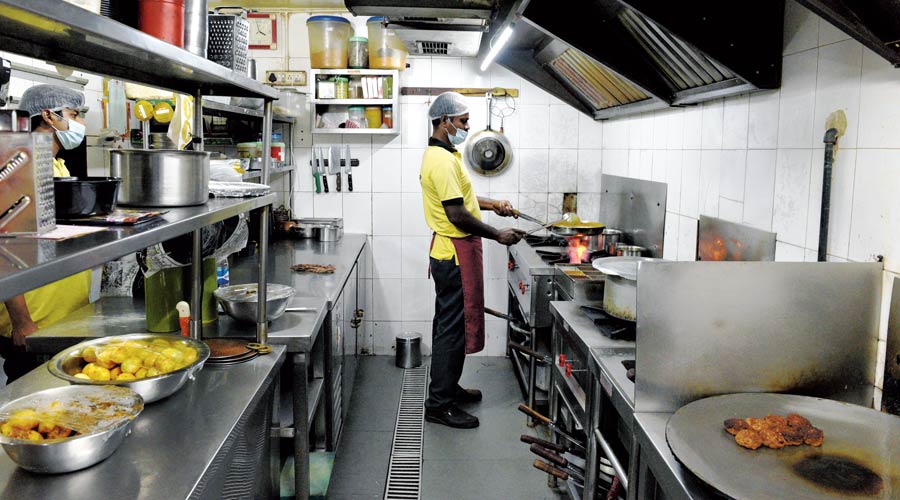The prices of essential commodities have shot up so much that even a boom in footfall is not enough to tide over the crisis, said owners of eateries across the city.
From cooking oil to vegetables, everything has become costlier. From a Park Street restaurant in the city’s central business district to a take-away joint on EM Bypass in east Kolkata, owners everywhere are feeling the heat.
A year ago, a 19kg commercial LPG cylinder came at Rs 1,500. Now, it costs over around Rs 2,200.
A year ago, the retail price of a litre of cooking oil was less than Rs 100. Now, it is close to Rs 200.
The rising fuel prices have a spiralling effect on the price of every other item, mainly because of higher transportation costs. The surge in the price of cooking gas has made things worse.
With the Covid threat perception at its lowest since the outbreak of the pandemic two years ago, restaurants have been witnessing a surge in footfall. But even that is not enough to offset the additional costs, especially if the losses incurred over the past two years are taken into account, said owners.
Asif Ahmed, owner of the Sanjha Chulha chain, which has five outlets specialising in north Indian cuisine and rolls, gave a detailed account of how the rising prices affected him.
He needs around 45 litres of oil (refined and mustard) every day. A couple of months ago, he spent around Rs 1,50,000 for a month’s oil. At the start of April, he had to shell out around Rs 2,00,000 for the same quantity.
A vendor who supplied basmati rice at Rs 95 per kilo in February is now charging Rs 102, attributing the rise to higher transportation costs following the jump in the diesel price.
The crushing blow has come in the form of the escalating cost of cooking gas. The price of one 19kg commercial LPG cylinder is around Rs 2,100 in Kolkata. In the latest price revision in March, it became costlier by more than Rs 100.
Ahmed needs around 100 cylinders every month.
“On an average basis, the production cost has gone up by 15 to 20 per cent. If things do not improve within the next couple of months, I will be forced to increase the prices,” said Ahmed.
Pratap Daryanani, owner of Oasis on Park Street, bought refined sunflower oil at Rs 2,200 per 15 litres on February 22. On March 26, he had bought the same amount for Rs 2,950.
“From lime to potato, everything has become costlier. Thank God the footfall is going up. Otherwise, it would have been difficult to continue,” said Daryanani.
A popular dish at his restaurant is chicken sizzler, which comes with a chicken breast, a fried egg, french fries and mashed vegetables. The dish costs Rs 540.
“If I have to increase prices on the menu to offset the rise in production cost, I will have to sell one plate of sizzler at Rs 640. That may be too much for customers because almost everybody has a cash crunch,” he said.
Several restaurateurs shared the same apprehension — that people were yet to recover from the financial losses from the pandemic and many might not be willing to pay anything extra.
Many restaurateurs said the rising costs could be managed either by raising the prices or through a surge in the volume of sales. But they also pointed out that the heat on business had been there for over two years.
“A sustained surge in footfall can help us tide over the crisis but it is too early to predict,” said Shiladitya Chaudhury of Oudh 1590.
Till two months ago, he bought meat from wholesalers at a rate which was “around Rs 70” less than the retail rate. The same trader has now been billing him at retail rate.
“If we increase prices, customers won't come. If we do not increase prices, we will be in trouble. Until the prices of fuel and other items come down, any significant revival from the pandemic blues looks improbable,” said Sudesh Poddar, president of the Hotel and Restaurant Association of Eastern India.
